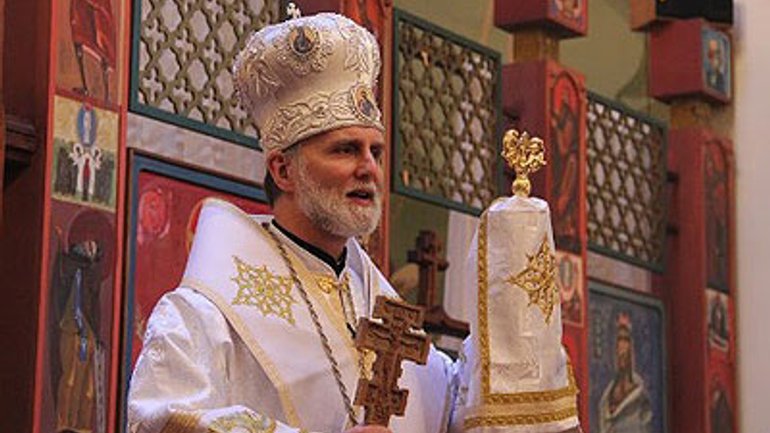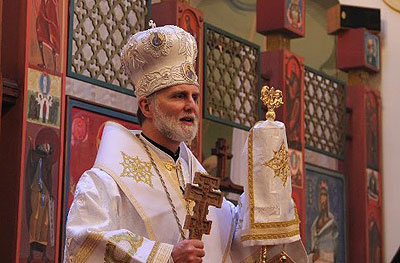Bishop Borys Gudziak: "The Church often represents people better than politicians do"

 In May 2014 Patriarch Sviatoslav (Shevchuk) appointed Bishop Borys Gudziak, Eparch of St. Volodymyr in Paris, as Head of the Office of External Relations of the Ukrainian Greek-Catholic Church. Kyr Borys presented his vision of this Office to the Synod of the Hierarchy of the UGCC. Recently, Father Teodosii Gren of the Ukrainian Section of Vatican Radio interviewed the bishop on this topic.
In May 2014 Patriarch Sviatoslav (Shevchuk) appointed Bishop Borys Gudziak, Eparch of St. Volodymyr in Paris, as Head of the Office of External Relations of the Ukrainian Greek-Catholic Church. Kyr Borys presented his vision of this Office to the Synod of the Hierarchy of the UGCC. Recently, Father Teodosii Gren of the Ukrainian Section of Vatican Radio interviewed the bishop on this topic.
My plan for the Office of UGCC External Relations was accepted by His Beatitude Sviatoslav and his Permanent Synod. I then presented it the Synod of the UGCC Hierarchy, which was held this year in Ivano-Frankivsk, and the Synod approved approved it. The project is to be implemented gradually. So far, I am the only member the Office, which does not yet have an active budget. For a year-and-a-half, I have been have been working with a few volunteers from various countries, who have been publishing news and information.
— What is your goal for this project?
— We live in a multi-confessional world. The department will promote UGCC’s relations with civil society, Roman Catholics, and other churches, especially the Orthodox and also protestants. It will also engage in relations with non-Christians, such as Jews and Muslims. It will also engage in international connections with government and non-government organizations, communities, and intellectual circles outside Ukraine. Brussels, Strasbourg, and Geneva are inside the area which forms my eparchy. These cities are the homes to important governmental and non-governmental head offices. London is close to Paris and Germany is not far. These countries are policy-making centres of Europe, where many aspects of family life that were mentioned at the recent Papal Synod are being discussed.
Ukraine is currently undergoing a period of war, where life, the economy, and even the country’s independence are in danger. In this humanitarian crisis our Church is being called defend our people, to protect the nation, to address moral problems and speak of the higher Truth, an to be a voice for the poor and suffering.
Clever diplomats and politicians understand the the Church often represents people better than politicians do. The Church is close to people: priests hear Confessions, they listen to the outpouring of the heart, and discuss the people’s problems with one another and with the bishop. For instance, at the highest levels, the French Government listens attentively to what the Church has to say. France has section in its Foreign Affairs Ministry, where a retired ambassador is appointed to deal with religious questions. Also, the French Embassies in Rome and in Jerusalem maintain a priest as as salaried counsellor. Ambassadors are very willingly listen to voice of the Church, and I know of this firsthand from the Orange Revolution of 2004 and the Revolution of Dignity of 2014. They want to know what non-governmental structures are saying. My experience is that the doors of many ambassadors are open to the Church. We must not exaggerate: the Church has no direct power or connections, but we can and must propose solutions.
— What are your immediate plans for the formation of the Office?
— It is important that this office be a church organization that, in every action, shares the Gospel message of joy and peace. It cannot be manipulative or intriguing . We are shepherds, baptized people, Christians who want to witness the Truths of the Gospel. In the next six months I hope to engage thirty people from different countries, who are willing to volunteer as contributors. I’d like to have people from, for example, Spain, Portugal, France, Germany, Scandinavia, Poland, Slovakia, the Czech Republic, Lithuania, Latvia, Estonia, Belarus. I am looking for people who have a good understanding of their countries and who are willing to provide information. In the next three months, we will begin encouraging the following: publish something on the UGCC, on Ukraine, on the war wounded, on orphans, on the humanitarian crisis in Ukraine. Next, we will organize a meeting, for example, in Madrid, at a church or university, with press coverage. We will thus share experience of our Church in people’s lives and show how Ukrainians have responded to various challenges.
We are living in a period of great democracy in the means of communications. We all have access to social means, such as blogs and website, radio programs and videos, with we can use to share our thoughts. And each one of us has something to share. I would ask every priest, once a month, to publish something, and to write in languages other than Ukrainian. We must not shout or publish aggressive material. We could present our view, for instance, of: how the war or aggression has affected our local parish; who has been called up for military service or who has been wounded or, God forbid, has died. The life of each parish is interesting as it represents the human life of its members. These experiences speak to the world.
We often complain that there are a lack of publications on Ukrainian issues or with the Ukrainian point-of-view. This is not discrimination if we ourselves don’t write or publish. Now-a-days, when someone comes to visit our church communities, they immediately ask: where is the brochure? If each UGCC parish had a good website, brochure about the parish and its history. If each parish priest prepared the history of their city or church community. These are interesting topics and they present the spiritual experience of Ukraine to our own communities and to the world at large.









